情态动词分类详解和练习
情态动词讲解以及倒装句练习40题(附答案)

may和might的用法 和 的用法
1. 表示许可。 表示请求、允许时,might比may的语气更委婉一些,否定回答时(口语中常 用) no , you can't . or , yes, please 用mustn't表示“不可以”、“禁止”、“阻 止”之意(具有强烈禁止的意思)如: You may drive the car. — Might I use your pen? — No, you mustn't. 用May I ... 征询对方许可在文体上比较正式,在口气上比较客气。在日常 口语中,用Can I ... 征询对方意见在现代口语中更为常见。
must和have to的用法 和 的用法
1. 表示必须、必要。(must表示主观多一些而have to则表示客观多一 些)如: You must come in time. 回答must引出的问句时,如果是否定的回答,不能用mustn't,而 要用needn't或don't have to。 — Must we hand in our exercise books today? — Yes, you must. (No, you don’t have to.)
Could 和 can 的用法
. 表示能力或客观可能性,还可以表示请求和允许。如: Can you finish this work tonight? Man can not live without air. — Can I go now? — Yes, you can. 注意:①could也可表示请求,语气委婉,主要用于疑问句,不可用于肯定句, 答语应用can(即could不能用于现在时态的简略答语中)。如: Could I come to see you tomorrow? Yes, you can. (否定答语可用No, I'm afraid not.) ②can表示能力时,还可用be able to代替。如: I'll not be able to come this afternoon.
情态动词分类
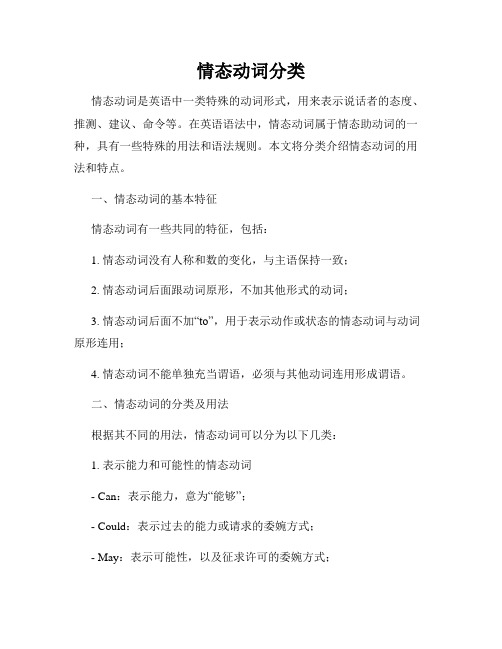
情态动词分类情态动词是英语中一类特殊的动词形式,用来表示说话者的态度、推测、建议、命令等。
在英语语法中,情态动词属于情态助动词的一种,具有一些特殊的用法和语法规则。
本文将分类介绍情态动词的用法和特点。
一、情态动词的基本特征情态动词有一些共同的特征,包括:1. 情态动词没有人称和数的变化,与主语保持一致;2. 情态动词后面跟动词原形,不加其他形式的动词;3. 情态动词后面不加“to”,用于表示动作或状态的情态动词与动词原形连用;4. 情态动词不能单独充当谓语,必须与其他动词连用形成谓语。
二、情态动词的分类及用法根据其不同的用法,情态动词可以分为以下几类:1. 表示能力和可能性的情态动词- Can:表示能力,意为“能够”;- Could:表示过去的能力或请求的委婉方式;- May:表示可能性,以及征求许可的委婉方式;- Might:表示较小的可能性或提出建议;- Shall:表示应该,常用于疑问句;- Should:表示应该,用于陈述句、建议或推荐;- Will:表示意愿,以及将来的行动或事件;- Would:表示过去的习惯或委婉的请求。
2. 表示允许和禁止的情态动词- Must:表示必须,用于肯定句和疑问句;- Have to:表示必须,用于陈述句和疑问句;- Need to:表示需要。
3. 表示推测和假设的情态动词- Must:表示强烈的推测;- May/might:表示可能性;- Can't/couldn't:表示否定的推测;- Should:表示推测或建议。
4. 表示意愿和目的的情态动词- Would:表示意愿、建议或委婉的请求;- Shall/will:表示意愿、请求或承诺;- Should:表示意愿、目的或建议。
5. 表示要求和命令的情态动词- Shall:表示命令或要求;- Should:表示命令或建议;- Must:表示强制性的要求。
6. 表示习惯和义务的情态动词- Must:表示必须遵守的规定或义务;- Should:表示习惯或预期的行为。
情态动词的用法及练习(附答案)
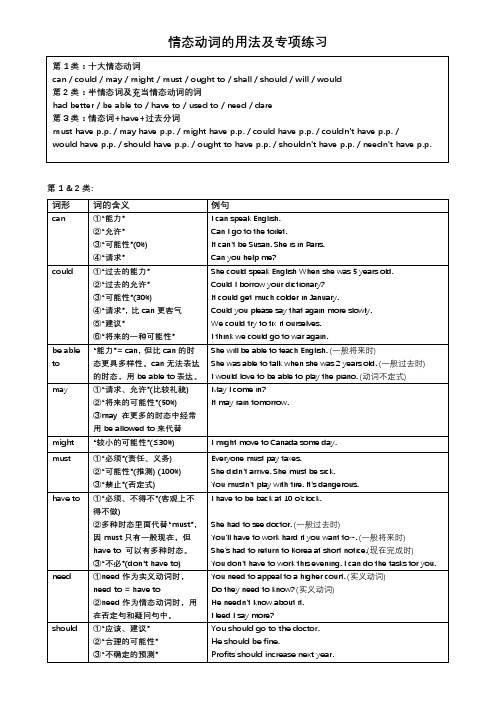
情态动词的用法及专项练习第1 & 2类:第3类1.could have p.p.①指过去某事有可能发生, 但并未.真的..发生。
They could have won the race, but they didn't try hard enough.He could have studied harder, but he was too lazy and that's why he failed the exam.②指过去有能力做某事, 但并未真的...做过。
I could have stayed up late, but I decided to go to bed early.Julie could have bought the book, but she borrowed it from the library instead.③对过去的发生事情做出一种猜测,但实际上并不知道真假。
仅仅是做一种观点上的表达。
He could have got stuck in traffic.He could have forgotten that we were meeting today.He could have overslept.2. may / might have p.p.(用法与could have p.p.第③点相同)对过去的发生事情做出一种猜测,但实际上并不知道真假。
仅仅是做一种观点上的表达。
He might have got stuck in traffic.He might have forgotten that we were meeting today.He might have overslept.3. couldn't have p.p.渴望、期望做某事, 但由于外部原因不可能做成, 即便是很想做。
是一种虚拟语气。
I couldn't have arrived any earlier. There was a terrible traffic jam (= it was impossible for me tohave arrived any earlier).He couldn't have passed the exam, even if he had studied harder. It's a really, really difficult exam.4. should / ought to have p.p.有一个好主意,该做而没有做。
小学英语情态动词知识点及练习

情态动词【知识要点】:情态动词(Modal verbs)本身有一定的词义, 表示语气的单词。
但是不能独立作谓语, 只能和动词原形一起构成谓语。
情态动词用在行为动词前, 表示说话人对这一动作或状态的看法或主观设想。
情态动词虽然数量不多, 但用途广泛, 主要有下列: can (could), may (might), must, need, ought to, dare (dared), shall (should), will (would) must not.情态动词无人称和数的变化, 情态动词后面跟的动词须用原形, 否定式构成是在情态动词后面加 "not"。
疑问形式是将情态动词提至主语前。
个别情态动词有现在式和过去式两种形式, 过去式用来表达更加客气, 委婉的语气, 时态性不强, 可用于过去, 现在或将来。
情态动词属非及物动词, 故没有被动语态。
【典型例题】:【专题一】:can和could的用法【例1】Can you lift this heavy box?(体力)【解析】表示能力(体力、知识、技能)【练习】1.Mary speak three languages.(知识)2... yo.skate?(技能)此时可用be able to代替。
Can只有一般现在时和一般过去式;而be able to 则有更多的时态。
I’ll not be able to come this afternoon.当表示“经过努力才得以做成功某事”时应用be able to,不能用Can。
【例2】-----Can I go now?----.Yes.yo.can..No.yo.can’t.【解析】表示请求和允许。
此时可与may互换。
在疑问句中还可用could,might 代替,不是过去式,只是语气更委婉,不能用于肯定句和答语中。
【练习】---- I come to see you tomorrow?---.Yes.yo.....----No.yo..../I’.afrai.not.【例3】Can this be true?【解析】表示推测(惊讶、怀疑、不相信的态度),用于疑问句、否定句和感叹句中。
情态动词的用法及练习(附答案)

情态动词的用法及专项练习第1 & 2类:词形词的含义例句can ①“能力”②“允许”③“可能性”(0%)④“请求”I can speak English.Can I go to the toilet.It can’t be Susan. She is in Paris. Can you help me?could ①“过去的能力”②“过去的允许”③“可能性”(30%)④“请求”, 比can更客气⑤“建议”⑥“将来的一种可能性”She could speak English When she was 5 years old. Could I borrow your dictionary?It could get much colder in January.Could you please say that again more slowly.We could try to fix it ourselves.I think we could go to war again.be able to “能力”= can, 但比can的时态更具多样性。
can无法表达的时态,用be able to表达。
She will be able to teach English. (一般将来时)She was able to talk when she was 2 years old. (一般过去时)I would love to be able to play the piano. (动词不定式)may ①“请求、允许”(比较礼貌)②“将来的可能性”(50%)③may 在更多的时态中经常May I come in?It may rain tomorrow.第1类:十大情态动词can / could / may / might / must / ought to / shall / should / will / would 第2类:半情态词及充当情态动词的词had better / be able to / have to / used to / need / dare用be allowed to来代替might “较小的可能性”(≤30%)I might move to Canada some day.must ①“必须”(责任、义务)②“可能性”(推测) (100%)③“禁止”(否定式) Everyone must pay taxes.She didn’t arrive. She must be sick.You mustn’t p l ay with fire. It’s dangerous.have to ①“必须、不得不”(客观上不得不做)②多种时态里面代替“must”,因must只有一般现在,但have to 可以有多种时态。
情态动词详解、典型例题及模拟试题(含答案)教学文案
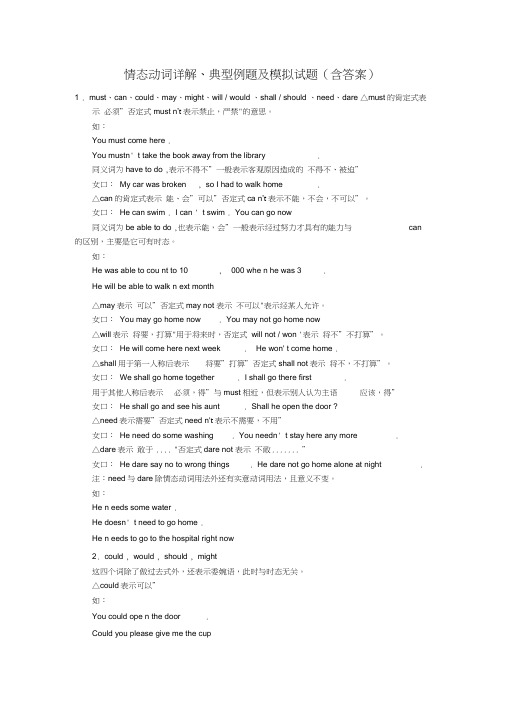
情态动词详解、典型例题及模拟试题(含答案)1 . must、can、could、may、might、will / would 、shall / should 、need、dare △must的肯定式表示必须”否定式must n't表示禁止,严禁"的意思。
如:You must come here .You mustn' t take the book away from the library .同义词为have to do ,表示不得不”一般表示客观原因造成的不得不、被迫”女口:My car was broken , so I had to walk home .△can的肯定式表示能、会”可以”否定式ca n't表示不能,不会,不可以”。
女口:He can swim . I can ' t swim . You can go now同义词为be able to do ,也表示能,会”一般表示经过努力才具有的能力与can 的区别,主要是它可有时态。
如:He was able to cou nt to 10 , 000 whe n he was 3 .He will be able to walk n ext month△may表示可以”否定式may not 表示不可以"表示经某人允许。
女口:You may go home now . You may not go home now△will表示将要,打算"用于将来时,否定式will not / won '表示将不”不打算”。
女口:He will come here next week . He won' t come home .△shall用于第一人称后表示将要”打算”否定式shall not表示将不,不打算”。
女口:We shall go home together . I shall go there first .用于其他人称后表示必须,得”与must相近,但表示别人认为主语应该,得”女口:He shall go and see his aunt . Shall he open the door ?△need表示需要”否定式need n't表示不需要,不用”女口:He need do some washing . You needn' t stay here any more .△dare表示敢于.... "否定式dare not 表示不敢....... ”女口:He dare say no to wrong things . He dare not go home alone at night .注:need与dare除情态动词用法外还有实意动词用法,且意义不变。
【英语】情态动词分类详解
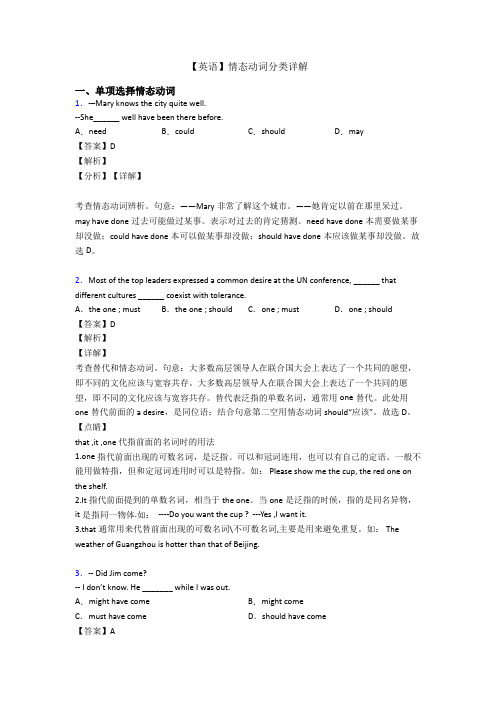
【英语】情态动词分类详解一、单项选择情态动词1.-–Mary knows the city quite well.--She______ well have been there before.A.need B.could C.should D.may【答案】D【解析】【分析】【详解】考查情态动词辨析。
句意:——Mary非常了解这个城市。
——她肯定以前在那里呆过。
may have done过去可能做过某事。
表示对过去的肯定猜测。
need have done本需要做某事却没做;could have done本可以做某事却没做;should have done本应该做某事却没做。
故选D。
2.Most of the top leaders expressed a common desire at the UN conference, ______ that different cultures ______ coexist with tolerance.A.the one ; must B.the one ; should C.one ; must D.one ; should【答案】D【解析】【详解】考查替代和情态动词。
句意:大多数高层领导人在联合国大会上表达了一个共同的愿望,即不同的文化应该与宽容共存。
大多数高层领导人在联合国大会上表达了一个共同的愿望,即不同的文化应该与宽容共存。
替代表泛指的单数名词,通常用one替代。
此处用one替代前面的a desire,是同位语;结合句意第二空用情态动词should“应该”。
故选D。
【点睛】that ,it ,one 代指前面的名词时的用法1.one 指代前面出现的可数名词,是泛指。
可以和冠词连用,也可以有自己的定语。
一般不能用做特指,但和定冠词连用时可以是特指。
如: Please show me the cup, the red one on the shelf.2.It 指代前面提到的单数名词,相当于the one。
情态动词的分类
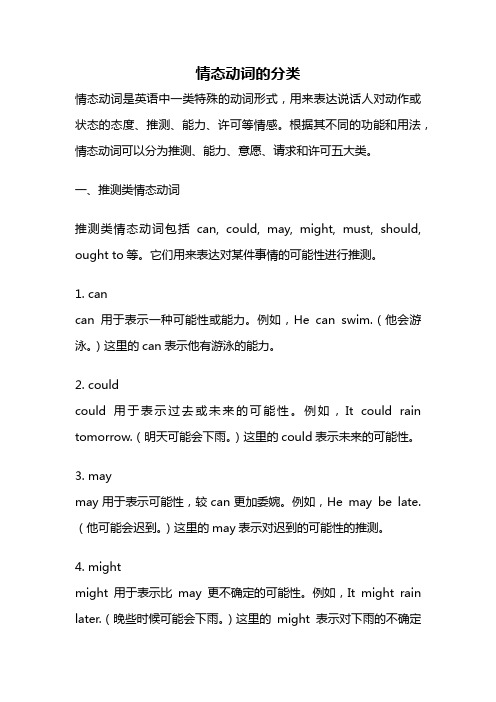
情态动词的分类情态动词是英语中一类特殊的动词形式,用来表达说话人对动作或状态的态度、推测、能力、许可等情感。
根据其不同的功能和用法,情态动词可以分为推测、能力、意愿、请求和许可五大类。
一、推测类情态动词推测类情态动词包括can, could, may, might, must, should, ought to等。
它们用来表达对某件事情的可能性进行推测。
1. cancan用于表示一种可能性或能力。
例如,He can swim.(他会游泳。
)这里的can表示他有游泳的能力。
2. couldcould用于表示过去或未来的可能性。
例如,It could rain tomorrow.(明天可能会下雨。
)这里的could表示未来的可能性。
3. maymay用于表示可能性,较can更加委婉。
例如,He may be late.(他可能会迟到。
)这里的may表示对迟到的可能性的推测。
4. mightmight用于表示比may更不确定的可能性。
例如,It might rain later.(晚些时候可能会下雨。
)这里的might表示对下雨的不确定性。
5. mustmust用于表示非常有可能的情况。
例如,It must be cold outside.(外面一定很冷。
)这里的must表示对外面很冷的肯定推断。
6. shouldshould用于表示应该或可能发生的情况。
例如,You should apologize to her.(你应该向她道歉。
)这里的should表示对向她道歉的建议。
7. ought toought to用于表示应该或可能发生的情况,语气更强烈。
例如,You ought to go to bed early.(你应该早点睡觉。
)这里的ought to表示对早睡的强烈建议。
二、能力类情态动词能力类情态动词包括can和could。
它们用来表示某人具有做某事的能力。
1. cancan用于表示某人具有做某事的能力。
情态动词讲解及练习(含答案)
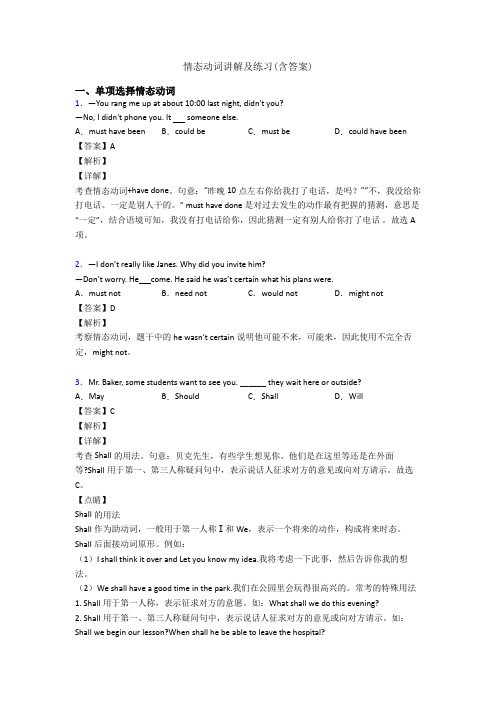
情态动词讲解及练习(含答案)一、单项选择情态动词1.—You rang me up at about 10:00 last night, didn't you?—No, I didn't phone you. It someone else.A.must have been B.could be C.must be D.could have been 【答案】A【解析】【详解】考查情态动词+have done。
句意:“昨晚10点左右你给我打了电话,是吗?”“不,我没给你打电话。
一定是别人干的。
” must have done 是对过去发生的动作最有把握的猜测,意思是“一定”,结合语境可知,我没有打电话给你,因此猜测一定有别人给你打了电话。
故选A 项。
2.—I don’t really like Janes. Why did you invite him?—Don’t worry. He come. He said he was’t certain what his plans were.A.must not B.need not C.would not D.might not【答案】D【解析】考察情态动词,题干中的he wasn’t certain说明他可能不来,可能来,因此使用不完全否定,might not。
3.Mr. Baker, some students want to see you. ______ they wait here or outside?A.May B.Should C.Shall D.Will【答案】C【解析】【详解】考查Shall的用法。
句意:贝克先生,有些学生想见你。
他们是在这里等还是在外面等?Shall用于第一、第三人称疑问句中,表示说话人征求对方的意见或向对方请示。
故选C。
【点睛】Shall的用法Shall作为助动词,一般用于第一人称Ⅰ和We,表示一个将来的动作,构成将来时态。
大学英语情态动词完整详细版附练习题

大学英语情态动词完整详细版附练习题情态动词概述情态动词是英语中一类特殊的动词,用于表达说话人的意愿、能力、推测、建议、许可等。
常见的情态动词有 "can"、"could"、"may"、"might"、"shall"、"should"、"will"、"would"、"must" 等。
以下是对每个情态动词的详细解释和用法:1. Can 表示能力、许可或请求。
例如:Can表示能力、许可或请求。
例如:- I can swim.(我会游泳。
)- Can I use your pen?(我可以用你的钢笔吗?)2. Could 过去式形式的 "can",表示能力、请求或礼貌的请求。
例如:Could过去式形式的"can",表示能力、请求或礼貌的请求。
例如:- I could ride a bike when I was five.(我五岁时就会骑自行车了。
)- Could you please open the window?(可以请你打开窗户吗?)3. May 表示许可或推测。
例如:May表示许可或推测。
例如:- May I go to the bathroom?(我可以去洗手间吗?)- It may rain tomorrow.(明天可能会下雨。
)4. Might 过去式形式的"may",表示推测或可能性较小。
例如:Might过去式形式的 "may",表示推测或可能性较小。
例如:- I thought it might be too late.(我想可能太晚了。
)5. Shall 表示将来时态的意愿、建议或命令。
例如:Shall表示将来时态的意愿、建议或命令。
情态动词知识点

情态动词知识点情态动词是英语中一类特殊的动词,用于表示说话人对某种动作或状态的态度、判断、推测或许可等。
它们在句子中往往与动词原形搭配使用,并起到修饰动词的作用。
情态动词在语法和用法上有一些特殊之处,下面将介绍情态动词的基本知识点。
一、情态动词的定义与种类情态动词是一类特殊的动词,用于表示说话人对某种动作或状态的态度、判断、推测或许可等。
常见的情态动词包括can, could, may, might, must, shall, should, will, would等。
它们都没有人称和数的变化,并且后面一般接动词原形。
二、情态动词的用法1. 表示能力或可能性例如:He can swim.(他会游泳。
)They may arrive early.(他们可能会早到。
)2. 表示许可或能力例如:Can I borrow your pen?(我能借用你的笔吗?)You may go now.(你现在可以走了。
)3. 表示推测或可能性例如:She might be busy.(她可能忙。
)They should arrive soon.(他们应该很快会到。
)4. 表示义务或建议例如:You must finish your homework.(你必须完成作业。
)We should recycle.(我们应该回收。
)5. 表示意愿或请求例如:I will help you.(我会帮你的。
)Would you please close the window?(你能请关窗户吗?)三、情态动词与时态的搭配情态动词本身没有时态,它们与后面的动词共同表达时间和语态的变化。
一般情况下,情态动词后面接动词原形,表示动作或状态的不同时间和语态变化由后面的动词来表达。
例如:- He can play the piano.(他会弹钢琴。
)- He could play the piano.(他过去会弹钢琴。
)- He will be able to play the piano.(他将来会会弹钢琴。
小学英语情态动词讲解和练习

Can I use your pen? Yes, here it is. Can you help me? Yes, I can.
我能用一下你的钢笔吗? 当然,给你。 你能帮帮我吗? 是的,当然。
Did you know? When you put not after can, you write it as one word: cannot. Learn these contractions: cannot= can’t Some birds cannot(can’t )fly.
2. 表示可能性时,常用在肯定句中,意为“可能,也许” He may be very busy now. 他现在可能很忙。 He said that she may not be at work today. 他说她今天也许不上班。
3. Can 和 may 都可以表示推测。can 通常用在否定句和疑问句中,may 通常用在肯定句和否定句中。 虽然两者都可以用于否定句,但是程度不同,can’t 的语气比may not 更强。
A. can B. may C. must
II. Read and write.
1. You _____c__a__n_________ (can) borrow my book, if you want. 2. They’ve lost the map and ___c__a__n___n___o__t__ (can) find their way back to the hotel. 3. May I go out to play now? No, you ___m___a___y___n__o__t________(may). 4. If you want to be healthy, you __m___u___s__t__n___o__t_____ (must) eat junk food. 5. You ___m___u___s__t__________ (must) believe yourself.
初中英语情态动词详细用法归纳(含练习及答案)
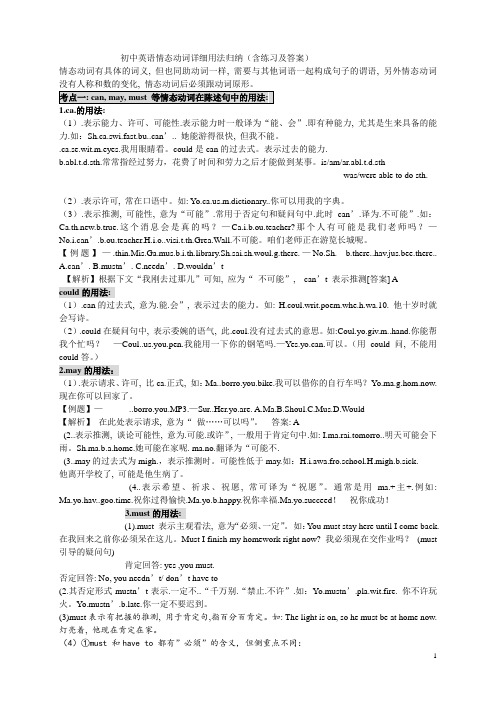
初中英语情态动词详细用法归纳(含练习及答案)情态动词有具体的词义, 但也同助动词一样, 需要与其他词语一起构成句子的谓语, 另外情态动词没有人称和数的变化, 情态动词后必须跟动词原形。
1.ca.的用法:(1).表示能力、许可、可能性.表示能力时一般译为“能、会”.即有种能力, 尤其是生来具备的能力.如:Sh.ca.swi.fast.bu..can’.. 她能游得很快, 但我不能。
.ca.se.wit.m.eyes.我用眼睛看。
could是can的过去式。
表示过去的能力.b.abl.t.d.sth.常常指经过努力,花费了时间和劳力之后才能做到某事。
is/am/ar.abl.t.d.sthwas/were able to do sth.(2).表示许可, 常在口语中。
如: .m.dictionary..你可以用我的字典。
(3).表示推测, 可能性, 意为“可能”.常用于否定句和疑问句中.此时can’.译为.不可能”.如:Ca.th.new.b.true.这个消息会是真的吗?—Ca.i.b.ou.teacher?那个人有可能是我们老师吗?—No.i.can’.b.ou.teacher.H.i.o..visi.t.th.Grea.Wall.不可能。
咱们老师正在游览长城呢。
【例题】—.thin.Mis.Ga.mus.b.i.th.library.Sh.sai.sh.woul.g.there.—No.Sh.__b.there..hav.jus.bee.there..A.can’.B.mustn’.C.needn’.D.wouldn’t【解析】根据下文“我刚去过那儿”可知, 应为“不可能”, can’t 表示推测[答案] Acould的用法:(1).can的过去式, 意为.能.会”, 表示过去的能力。
如: H.coul.writ.poem.whe.h.wa.10. 他十岁时就会写诗。
(2).could在疑问句中, 表示委婉的语气, 此.coul.没有过去式的意思。
小升初英语情态动词专题讲解及练习

小升初英语必考点情态动词:情态动词有词义,但它不能单独作谓语,它必须和其他动词一起构成谓语。
情态动词没有人称和数的变化;它的后面必须跟动词原形。
一、情态动词的种类:情态动词有can (could), must, have to, shall (should), will (would)等,这些是小学阶段需掌握的情态动词。
二、情态动词的用法:注意:can not=can’t could not=couldn’t1) 表示能力(体力、知识、技能)。
I can sing.我会唱歌。
He can draw pictures.他会画画。
2) 表示请求和允许。
Could \Can you help me? 你能帮助我吗?---- Yes, of course.\Certainly.\ Sure.Could \Can you tell me the way to the Zoo? 你能告诉我去动物园的路吗?1) must表示必须、必要, 带有命令强制口气;而have to表示不得不,很勉强,强调客观需要。
We must help each other.我们必须互相帮助。
My sister is ill,I have to look after her.我的妹妹病了,我必须要照顾她。
注意:must的否定形式mustn’t表示禁止,意思是“不能,不许”。
在回答由must引起的疑问句时,如果是否定的,不能用mustn’t(禁止,不准),而用needn’t, don’t have to(不必要)。
— Must I do homework now ?—肯定:Yes, you must.否定:No, you don’t have to / you needn’t.应该”,表示劝告、建议等。
注意:should not=shouldn'tI should finish my homework before watching TV.我应该看电视之前完成作业。
高考英语情态动词讲解及习题(附答案)
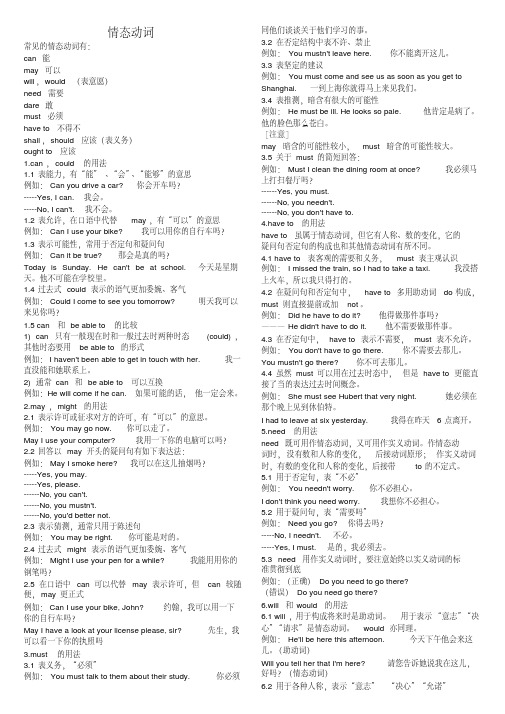
情态动词常见的情态动词有:can 能may 可以will,would (表意愿)need 需要dare 敢must 必须have to 不得不shall,should 应该(表义务)ought to 应该1.can,could 的用法1.1表能力,有“能”、“会”、“能够”的意思例如:Can you drive a car? 你会开车吗?-----Yes, I can. 我会。
-----No, I can't. 我不会。
1.2表允许,在口语中代替may,有“可以”的意思例如:Can I use your bike?我可以用你的自行车吗?1.3表示可能性,常用于否定句和疑问句例如:Can it be true?那会是真的吗?Today is Sunday. He can't be at school.今天是星期天。
他不可能在学校里。
1.4过去式could表示的语气更加委婉、客气例如:Could I come to see you tomorrow?明天我可以来见你吗?1.5 can 和be able to 的比较1) can 只有一般现在时和一般过去时两种时态(could),其他时态要用be able to的形式例如:I haven't been able to get in touch with her.我一直没能和她联系上。
2) 通常can 和be able to 可以互换例如:He will come if he can.如果可能的话,他一定会来。
2.may,might的用法2.1表示许可或征求对方的许可,有“可以”的意思。
例如:You may go now.你可以走了。
May I use your computer?我用一下你的电脑可以吗?2.2回答以may开头的疑问句有如下表达法:例如:May I smoke here? 我可以在这儿抽烟吗?-----Yes, you may.-----Yes, please.------No, you can't.------No, you mustn't.------No, you'd better not.2.3表示猜测,通常只用于陈述句例如:You may be right.你可能是对的。
人教版七年级上册英语情态动词分类及用法+练习
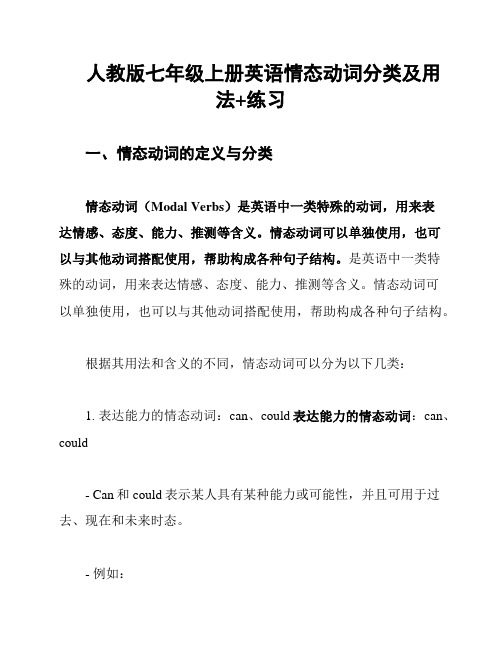
人教版七年级上册英语情态动词分类及用法+练习一、情态动词的定义与分类情态动词(Modal Verbs)是英语中一类特殊的动词,用来表达情感、态度、能力、推测等含义。
情态动词可以单独使用,也可以与其他动词搭配使用,帮助构成各种句子结构。
是英语中一类特殊的动词,用来表达情感、态度、能力、推测等含义。
情态动词可以单独使用,也可以与其他动词搭配使用,帮助构成各种句子结构。
根据其用法和含义的不同,情态动词可以分为以下几类:1. 表达能力的情态动词:can、could表达能力的情态动词:can、could- Can和could表示某人具有某种能力或可能性,并且可用于过去、现在和未来时态。
- 例如:- I can speak English fluently.(我能够流利地说英语。
)- She could swim when she was five years old.(她五岁时就会游泳了。
)2. 表示推测的情态动词:may、might表示推测的情态动词:may、might- May和might表示推测、猜测,并且表示可能性。
- 例如:- He may be at home.(他可能在家。
)- They might arrive late.(他们可能会迟到。
)3. 表示允许和许可的情态动词:may、can表示允许和许可的情态动词:may、can- May和can可以用来表示允许或许可。
- 例如:- Can I have some water, please?(请给我一些水好吗?)4. 表示义务和建议的情态动词:must、should表示义务和建议的情态动词:must、should- Must表示义务,表示某事必须要做。
- Should表示建议,表示某事是应该要做的。
- 例如:- You must finish your homework before you go out.(你必须在出门前完成作业。
)- You should drink more water.(你应该多喝水。
初中英语语法:情态动词讲解及练习
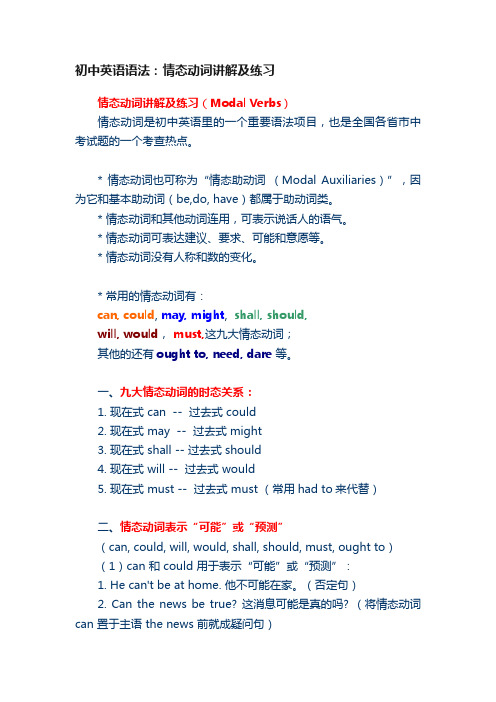
初中英语语法:情态动词讲解及练习情态动词讲解及练习(Modal Verbs)情态动词是初中英语里的一个重要语法项目,也是全国各省市中考试题的一个考查热点。
* 情态动词也可称为“情态助动词(Modal Auxiliaries)”,因为它和基本助动词(be,do, have)都属于助动词类。
* 情态动词和其他动词连用,可表示说话人的语气。
* 情态动词可表达建议、要求、可能和意愿等。
* 情态动词没有人称和数的变化。
* 常用的情态动词有:can, could, may, might, shall, should,will, would,must,这九大情态动词;其他的还有ought to, need, dare等。
一、九大情态动词的时态关系:1. 现在式 can -- 过去式 could2. 现在式 may -- 过去式 might3. 现在式 shall -- 过去式 should4. 现在式 will -- 过去式 would5. 现在式 must -- 过去式 must (常用had to来代替)二、情态动词表示“可能”或“预测”(can, could, will, would, shall, should, must, ought to)(1)can 和 could 用于表示“可能”或“预测”:1. He can't be at home. 他不可能在家。
(否定句)2. Can the news be true? 这消息可能是真的吗? (将情态动词can 置于主语 the news 前就成疑问句)3. Anybody can make mistake. 任何人都可能犯错误。
(只表示理论上的可能性)(2)may 和 might 用于表示“事实上的可能性”或“预测”:1. It may rain tomorrow. (表示可能会发生)明天可能会下雨。
2. It may snow later this afternoon. (表示预测)今天下午可能会下雪。
- 1、下载文档前请自行甄别文档内容的完整性,平台不提供额外的编辑、内容补充、找答案等附加服务。
- 2、"仅部分预览"的文档,不可在线预览部分如存在完整性等问题,可反馈申请退款(可完整预览的文档不适用该条件!)。
- 3、如文档侵犯您的权益,请联系客服反馈,我们会尽快为您处理(人工客服工作时间:9:00-18:30)。
dare
need
①“敢”,后接动词原形,用于否定或疑问及 if 或 whether 之后,肯定用must , have to代替。 ②肯定句中作实动词 You needn’t call him. --- Need I come ? --- No , you needn’t Yes , you must(should 、ought to)
Will
①表示“意愿、决定、允许” If you have any difficulties, I will lend you a hand . I will never do that e whenever you will. ②表示临时做的决定。 --- Sorry , I forgot to post your letter. --- Never mind, I will go now. ▼ 在疑问句中用于第二人称,表示“询问或请求” Will you please pass me that book? Won’t you come to our party this evening? ③回答请求、命令的句子时。 ---Don’t touch my books when I was away. --- I won’t.
must
1. 表“必须”(主观看法)必须;无过去式,用间 引 (抱怨)语气,“偏偏” 2. 疑问句 Must I …? Yes, you must.(一定) No, you needn’t./ you don’t have to.(不必) 3.否定句 表示禁止, 译为“不准”、“不允许”
have to
shall
①用于第一、三人称疑问句中,表征求意见,请示。(为他人 提供服务或帮助) (1)Shall we begin our class? (2)--- Shall the driver wait outside ? --- yes , please. (3)When shall my father be able to leave hospital ? ②用于第二、三人称肯定句中,表命令、警告、许诺。 You shall go with me . You shall have the book when I finish it . ③说话人征求对方意见,建议做谋事 Shall I (we)… ④用于第一人称, 表示决心或决定。 I shall( will ) come if I want to . ⑤用于正式文字, 表示许诺、命令、法令。“必须、必将”
1. 表“必须”(客观需要)不得不,有多种时 态。 2. 疑问句 Do you have to go today? Yes, we do. You don’t have to worry about that. 3.否定句 don’t have to 译为“不必”
表达推测的情态动词
Must必定、必然 (肯定式) 对现代推测 Must be …. Must be doing 对过去推测 Must have done Must have been doing
①can’t ….. too / enough ② can’t but do sth
③ can but
④ can’t but ⑤ can (could) not help but ⑥ can (could) not choose but
May might
• 表示可能性(推测)(表示某事发生的实际 可能性) ①---Will you answer the doorbell ? --- It may be your father. ② We may go camping next Sunday. (多用于肯定式、否定式) ③According to the weather forecast, it may rain tomorrow.
peoples last forever !
be able to
• 表示在具体事情中体现的具体能力
(1)When he was three ,he __________( 会游泳). (2)You ___________(不能喝酒) (3)The fire broke out , but he__________( 能 ) escape from the building . (4)We _______(能)arrive on time. (5)Try hard, you w____________(会) go to college.
can
• 泛指一般性的能力 She can speak French . • 表示可能性(推测)
▼(客观的可能性,并不牵涉具体的事情是否会发生) ▼(多用于否定式、疑问式)
• 请求
疑问句,征求意见,多用第二、三人称
Can you give a room for the night?
• 许可,允许
在肯定句中 ,can 表现在 (侧重客观 “许可”)
④ 表示推测,用在肯定句中,对现在的情况 或可能发生的事的主观推测或期待。意为 “想必,大概,或许” 1.It should be a nice day tomorrow. 2.He should be around sixty years old. 5、在if条件句,从句谓语用should+动词原 形,主句用虚拟6、should表惊讶, 惋惜, 译为“竟然”。
注意:may一般不用于反意疑问句,其反 问部分用could.
① may well do sth
② may /might (just ) as well
③ if I may say so
④ if I may ask
⑤ I wish go go home , may I ?
⑥ May the friendship between our
⑦当询问对方意愿时,可以用will/ would you..
– Will you come this way , please? – Would you have another drink? – won’t you… 、 – can /could you …would you like to … ? – would you mind ….?
---What’s the name? --Khulaifi. ___I spell that for you?A. Shall B. Would C. Can D. Might
Should
①表示劝告、建议、命令“应该” You should wash your hands first.We should learn how to use computer. ②Should和why, how 连用, 表示“难以理解,不可 思议” I don’t know why you should think I did it . ---- Will you please help him carry the heavy box? ---- Why should I ? ③用于第一人称, 表示委婉提出意见或看法 I should say he is the right person for the job.
• 表示请求----比can 委婉客气。 ①--- Could I come here ? --- Yes, you can. A , Yes , you may B, Yes, you could C, No, you can’t D, Yes, please
• 表示许可 • 在肯定句中 , could 表过去(用过去时) My English teacher said that I could go to his office whenever I had any questions .
• 许可,允许 ▼(侧重说话人给予的“许可”) Students may use any instruments while they are making experiments.
Since you have finished your work now, you may go out to play.
• 请求 ▼在疑问句中,征求对方意见时,第一人称 用may, might. ①--May I watch TV now? -- No, you mustn’t (can’t)
---- No ,please don’t ---Yes , you may. (---- Yes, please.) ( --- Yes, certainly. ) ---No , you mustn’t
Would you mind doing… ?
①只用否定句、疑问句、条件状语从句 (改错) She dared not do it yesterday. Dare you to go home alone at eleven in the evening ? He asked me if I dare go there alone ( ) ②实动词(后接带to的不定式, 否定句to可以省略) I dare say… I dare say there are some mistakes. ③dare 的过去式dared (改错) No one dared to say that he could not see it. He ___________ go home yesterday. (不敢)
Should
• 应该(时间是现在或将来)
• 肯定式 ◆Should be
Ought to
• (按道理来说) • 肯定式 • Ought to be
Can
不可能 否定式: 对现在推测: Can’t be …. Can’t be doing … 对过去推测: Can’t have done …. Can’t have been doing doing 有可能吗? 疑问式: 对现在推测: Can 主语 be ? Can 主语 be doing … 对过去推测: Can主语 have done …. Can 主语 have been
